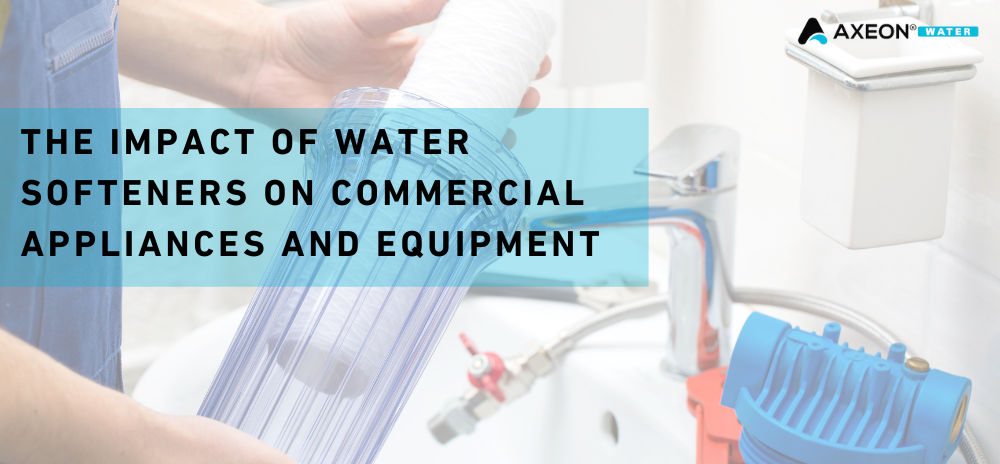Technical Articles

Water softeners play a vital role in ensuring the longevity and efficiency of these essential tools. By grasping the role of water softeners and recognizing their importance in commercial environments, businesses can make well-informed choices regarding their integration into operational processes.
Water Softeners and Their Purpose
Water softeners are systems designed to remove minerals, such as calcium and magnesium, from hard water. Hard water contains high levels of these minerals, which can lead to mineral buildup and scale in appliances and equipment over time. Water softeners typically use a process called ion exchange to replace these minerals with sodium or potassium ions, resulting in soft water that is less damaging to commercial appliances and equipment.
Significance of Water Softeners for Commercial Appliances and Equipment
The use of water softeners in commercial settings has numerous benefits. Firstly, they prevent mineral buildup and scale, which can affect the performance and efficiency of appliances and equipment. By reducing scale, water softeners help extend the lifespan and reduce maintenance costs of these valuable assets. Secondly, soft water promotes better cleaning results and reduces the need for excessive use of detergents and cleaning agents.
The implementation of water softeners in commercial settings is essential for preserving the integrity and functionality of appliances and equipment. By investing in water softening systems, businesses can ensure optimal performance, cost savings, and increased longevity.
Effects of Hard Water on Commercial Appliances
Negative impact of hard water on appliances and equipment
Hard water, which contains high levels of minerals like calcium and magnesium, can have detrimental effects on commercial appliances and equipment. The minerals in hard water can build up over time, leading to scale and clogs in pipes, valves, and heating elements. This can result in decreased efficiency and performance, as well as increased energy consumption.
Appliances such as ice machines, coffee makers, dishwashers, and steamers are particularly susceptible to the negative effects of hard water. Scale buildup can cause decreased water flow, reduced heat transfer, and even complete breakdown of these essential tools. This not only leads to costly repairs and replacements but also disrupts the smooth operation of commercial establishments.
Examples of common issues caused by hard water:
Common issues caused by hard water in commercial appliances include:
- Scale and mineral buildup in pipes, leading to reduced water flow and decreased efficiency.
- Clogged valves and filters that impair the performance of equipment.
- Inefficient heating elements due to scale buildup, resulting in higher energy consumption.
- Poor water quality for food and beverage preparation, affecting taste and appearance.
- Reduced lifespan and frequent breakdowns of appliances, leading to increased maintenance costs.
The impact of hard water on commercial appliances can be significant and costly. Implementing water softeners to remove minerals from the water supply is essential for maintaining the longevity and efficiency of these vital tools, ensuring smooth operations and cost savings for businesses.
How Water Softeners Work
Water softening process
Water softeners are essential in mitigating the negative impact of hard water on commercial appliances and equipment. The water softening process involves removing minerals such as calcium and magnesium that cause hardness in the water.
The first step is the ion exchange process. Hard water enters the mineral tank of the water softener system, which contains resin beads coated with sodium ions. As the water flows through the resin, the calcium and magnesium ions are attracted to the resin and exchange places with the sodium ions, effectively softening the water.
Once the resin becomes saturated with calcium and magnesium ions, it needs to be regenerated. This is accomplished by flushing the resin with a concentrated salt solution known as brine. The brine displaces the calcium and magnesium ions from the resin and flushes them away, resetting the resin beads for the next water softening cycle.
Different types of water softeners available
There are various types of water softeners available, including salt-based water softeners, salt-free water softeners, and magnetic or electronic water conditioners.
Salt-based water softeners are the most common and effective type. They use large tanks of resin beads and require regular addition of salt for the regeneration process. Salt-free water softeners, on the other hand, use alternative technologies such as template-assisted crystallization or electromagnetic pulses to alter the structure of the minerals, preventing them from adhering to surfaces.
Magnetic or electronic water conditioners work by using magnetic fields or electrical charges to modify the properties of the minerals in hard water. While they don't physically remove the minerals, they claim to reduce the negative effects of hard water on appliances and equipment.
Water softeners are crucial in preventing scale buildup, clogs, and reduced efficiency in commercial appliances caused by hard water. Choosing the right type of water softener depends on the specific needs of the business and the level of hardness in the water supply.
Benefits of Water Softeners for Commercial Appliances
Improved lifespan and performance of appliances
Water softeners enhance the longevity and efficiency of commercial appliances and equipment. Hard water, which contains high levels of minerals like calcium and magnesium, can cause mineral deposits and scaling on the internal components of appliances such as coffee makers, dishwashers, and steam ovens. This buildup restricts water flow, reduces heating efficiency, and can lead to malfunctions or breakdowns. By removing these minerals through the water softening process, appliances can function optimally, resulting in longer lifespan and improved performance. Softened water also helps to prevent corrosion and mineral buildup in plumbing systems, ensuring uninterrupted water flow and reducing the risk of costly repairs.
Reduction in maintenance and repair costs
One of the significant advantages of using water softeners for commercial appliances is the reduction in maintenance and repair costs. Hard water can cause limescale buildup on heating elements, pipes, and other sensitive parts of appliances. This buildup not only affects the performance but also reduces energy efficiency and increases the likelihood of breakdowns. By installing a water softener, businesses can minimize scaling and clogging issues, which means less frequent repairs and maintenance tasks.
Soft water also allows for the use of fewer detergents and cleaning agents, reducing the costs associated with purchasing and using these products. Incorporating water softeners into commercial operations can lead to significant savings in maintenance and repair expenses.
Case Studies
Real-life examples showcasing the impact of water softeners on commercial appliances
Water softeners have proven to be highly beneficial for businesses in various industries. Here are real-life examples that illustrate the positive impact of water softeners on commercial appliances and equipment.
- Hotel Industry: A luxury hotel in a region with hard water experienced frequent breakdowns and reduced efficiency in their laundry machines and dishwashers. By installing water softeners, the hotel saw significant improvements in the performance and longevity of their appliances. The softened water helped eliminate mineral buildup and scaling, resulting in reduced maintenance costs and enhanced guest satisfaction.
- Restaurant Chains: Several restaurant chains that rely heavily on dishwashers and steam ovens have incorporated water softeners into their operations. By using softened water, they have witnessed a remarkable decrease in repairs, downtime, and energy consumption. Their appliances now operate at optimal efficiency, ensuring a seamless dining experience for their customers.
- Hospital and Healthcare Facilities: In healthcare settings, water softeners have proven crucial in preventing mineral buildup in medical equipment, sterilizers, and plumbing systems. By using soft water, these facilities have reduced the risk of costly breakdowns, maintained compliance with hygiene standards, and extended the lifespan of their medical devices.
These case studies demonstrate the tangible benefits of incorporating water softeners into commercial operations.
By investing in a water softening system, businesses can improve appliance performance, minimize repair costs, and enhance overall operational efficiency.
Considerations for Choosing a Water Softener
Factors to consider when selecting a water softener for commercial use
When choosing a water softener for commercial use, there are several important factors to consider. First and foremost, it is crucial to understand the specific needs of your business and the volume of water you will be treating. Consider the hardness level of your water supply and the capacity requirements of your appliances and equipment.
Secondly, you should evaluate the efficiency and effectiveness of the water softener system. Look for a unit that can efficiently remove minerals and reduce scaling without compromising the water flow rate. Consider the regeneration process of the system as well, as this will impact the downtime and overall efficiency of your operations.
Another important consideration is the size and space requirements of the water softener. Ensure that you have adequate space for installation and maintenance and select a unit that fits well within your facility.
Importance of professional installation and maintenance
Professional installation and maintenance are highly recommended when it comes to water softeners for commercial use. Hiring a professional ensures that the system is correctly installed, calibrated, and optimized for your specific needs. They can also provide guidance on the proper operation and maintenance of the unit.
Regular maintenance by a professional is essential to keep the water softener running smoothly and efficiently. This includes routine inspections, cleaning, and scheduled regeneration to prevent issues such as resin fouling and bacterial growth.
By investing in professional installation and maintenance, you can prolong the lifespan of your water softener, minimize downtime, and ensure optimal performance for your commercial appliances and equipment.
Key Takeaways
Water softeners are important in maintaining the efficiency and longevity of commercial appliances and equipment. By effectively removing hard water minerals, these systems prevent scaling and buildup, ensuring optimal performance. The benefits include improved water flow rate, reduced energy consumption, extended lifespan of appliances, and minimized downtime due to maintenance or repairs. Professional installation and regular maintenance are highly recommended to maximize the benefits and minimize the risks associated with water softeners.
Long Story Short
Water softeners are an integral part of maintaining the productivity and efficiency of commercial operations. By investing in a water softener system, businesses can protect their appliances and equipment, reduce operational costs, and ensure consistent performance. It is crucial to consider the specific needs of the business, evaluate the efficiency and capacity requirements, and prioritize professional installation and maintenance. By doing so, businesses can reap the benefits of improved water quality and reliability, leading to better customer satisfaction and overall success.
THE RIGHT SOLUTION FOR YOU
Contact us today for more information about our products and services.
CONTACT US

